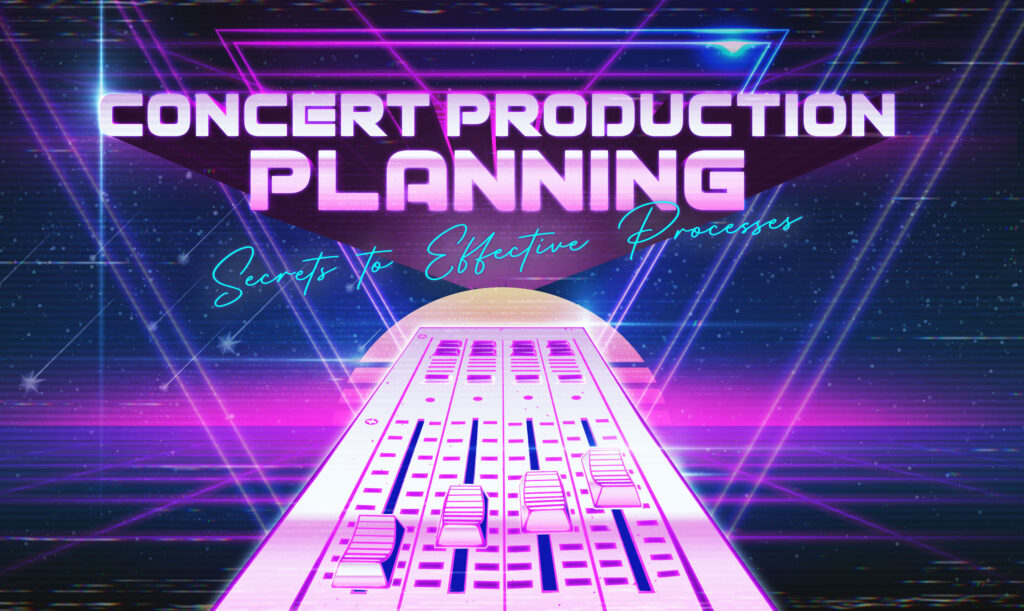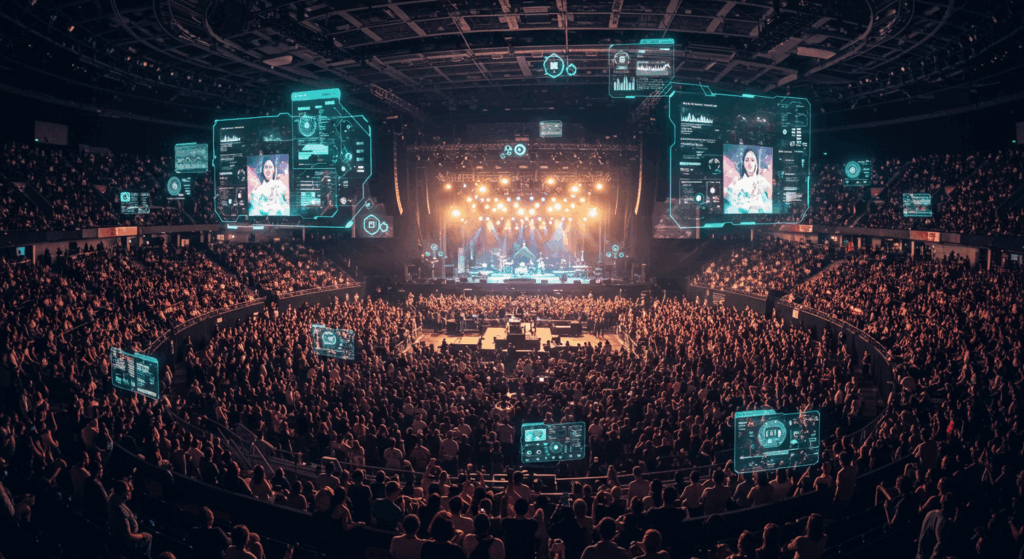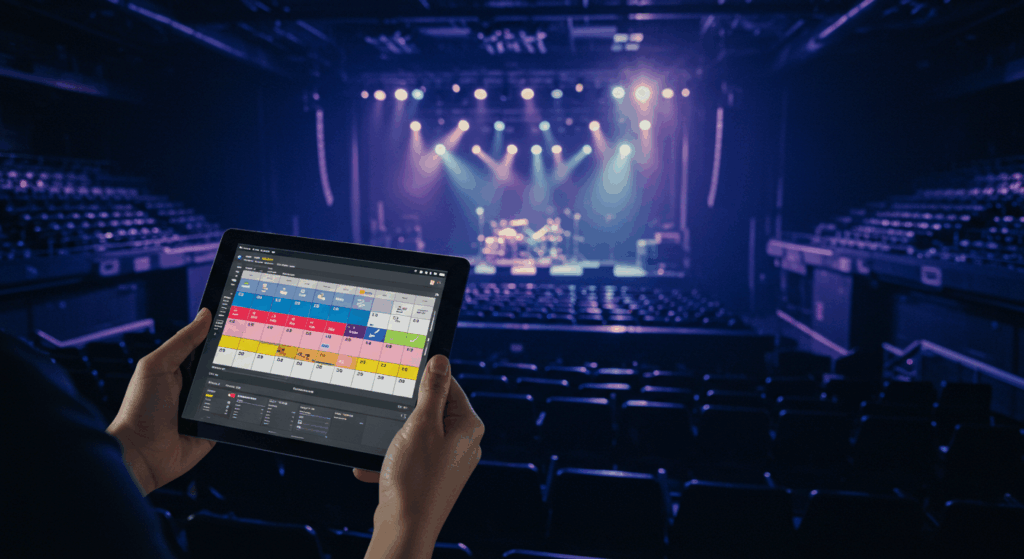
Secrets to an Effective Concert Production Planning Process
Organizing a great concert is no easy feat. It requires a delicate balance of equipment and skilled personnel, meticulous planning, and the ability to adjust on the fly. While the band might be ready to rock, concert planners must ensure that every detail is taken care of to ensure a successful event.
However, organizing a great concert goes beyond just organization and guidelines. Successful concert planners are always looking for ways to improve the process and create a better experience for everyone involved.
With the global revenue for live music reaching $25 billion this year, there is an epic opportunity for planners and promoters to take the industry to new heights. But to turn this opportunity into reality, even experienced professionals need to evaluate their processes and ensure they have the right systems in place.
Here are nine secrets for turning your concert production process into the best possible show every time.
Secret #1: Clear and prompt communication can save the day
Horror stories in live music usually get more publicity than shows that narrowly avoid disaster. Consider a September 2021 Nas concert in Queens, NY. A heavy rainstorm and flash floods made a mess of the city, leaving the legendary hip-hop star stuck in his trailer while the production team figured everything out. The planners suddenly had to deal with thousands of frantic concertgoers battling extreme elements in an open-air amphitheater (Forest Hills Stadium).
Show producer Josh Wood credits communication with getting them through the near debacle. Wood and his team were able to quickly hand out thousands of rain jackets to the audience while the technicians prepared for the rain to lighten up. Quick, clear communication allowed Wood to execute a contingency plan that kept the fans safe while the show dealt with new technical hurdles. And when the storm let up, Nas had the confidence in Wood’s team to take the stage in the pouring rain and deliver to his fans.
This event is a perfect example of what can go right. An unforeseen event can scramble a production team, testing communication channels and forcing promoters to quickly change gears. Wood only managed to avert a crisis by keeping all stakeholders completely in sync as the show reassembled in real time.
Secret #2 Establish a detailed timeline
Every production needs a strong project management timeline from the outset. Organizing tasks on a calendar can help to snap the bigger picture into focus, making sure that details aren’t overlooked in the process. Concert organizers also use detailed outlines to ensure everyone knows exactly what is expected of them and when. With appropriate deadlines, the concert begins to take shape and planners can adjust as inevitable challenges arise.
Related: What to expect from the event promotion and concert industry in 2023
Pro Tip: Firm deadlines provide structure for the timeline—however, savvy planners honor Murphy’s law and know which elements can be rearranged and reprioritized. With realistic deadlines and effective communication, the original timeline will still closely resemble the actual run of show, as you handle challenges to make sure the show goes on.
“Anything that can go wrong will go wrong” – Murphy’s Law
Secret #3: Stick to the budget
Budgeting doesn’t sound like anyone’s dream of a career in live music, but its importance can’t be downplayed. With elevated production costs due to macroeconomics and supply-chain issues, budgeting is even more critical than it was before. An accurate budget projection of equipment and staff gets you started, but you need to keep an eye on specific costs and fees as the pieces come together. Concert planners can get ahead of finances by using a system that can track actual expenses and revenue against estimates in real-time.
With reliable cost projections and a way to track expenses, you can make sure that you stick to the budget. Concert budgeting is also crucial for bringing the hype of events and entertainment back to reality.
Secret #4: Evaluate all angles when selecting a venue
We know that selecting the right venue is critical, but what does that entail? Before even visiting a site, you must consider the location from the perspective of the likely audience. Venues in remote areas can be great for concert acts that will pull crowds from across a large region. Some shows might require good access to public transportation and other shows can rely heavily on diverse city crowds and tourism. Determining the appropriate location, size and capacity based on realistic ticket sale expectations is crucial for honing in on the right venue.
Another bedrock of the process is evaluating whether the venue meets the performers’ needs for a great live show . Planners can rely on their own technical expertise to an extent, but it’s never a bad idea to double check with the artist’s team and ask for opinions from other professionals. Once you know that the location, capacity, technical capability, stage, acoustics and general atmosphere of a venue works for your act you can move quickly. Balancing the needs of the audience, the act, and your various teams will ensure you find a venue that will best capture the show’s potential.
Secret #5: Form a contingency plan well in advance
Clear communication won’t save you in a crisis if you don’t have a viable contingency plan. This can mean having extra staff ready to fill in and having an emergency plan for severe weather. Being prepared for many outcomes gives a concert organizer a significant edge.
It’s also important to have a financial contingency plan. You might need a last-second infusion of cash to replace equipment or to bring on supplemental staff. If possible, building some contingency funds into your budget can be a lifeline in unanticipated circumstances.
Secret #6: Focus on the details
Concert production planners often show their passion and experience by mastering the details. Does the setup satisfy the band’s requirements? Does it create the intended atmosphere for the audience? Technical proficiency certainly helps a concert production planner, but this is also an area where you’ll likely need to delegate and rely on other experts to cover lighting, stage and sound quality.
Secret #7: Collaborate with the venue
Working hand-in-hand with the venue staff is another fundamental component of successful concert production. This means getting to know the venue’s technical staff and establishing great communication channels from the beginning. The venue staff can usually help you with important logistical issues like load-in and load-out times, which will be important for establishing your timeline.
They should also point you in the right direction for any required permits, but it’s usually a good idea to do your own due diligence as well on this front. Not obtaining the right permit in time for a show can be an easy way to court disaster.
Related: Tips for setting growth goals for your agency
When working with a venue, it’s important to understand its unique requirements, limitations, and preferences. By taking the time to communicate effectively and work collaboratively with the venue’s team, you can ensure that your event runs smoothly and meets everyone’s expectations.
Moreover, building a strong relationship with the venue and its staff can lead to repeat business and referrals, as well as access to valuable industry insights and connections. By treating the venue and its staff with respect, you can establish yourself as a reliable and trustworthy partner, which can pay off in the long run.
Secret #8: Understand best practices for health and safety
Ensuring health and safety is a top priority for any concert production planner. It’s important to familiarize yourself with the best practices to minimize risks and prevent accidents. This includes actively identifying potential hazards, ensuring accessibility for all attendees, and monitoring environmental conditions such as severe weather.
As part of your safety protocols, it’s recommended to personally inspect all equipment to ensure it meets safety standards. This includes verifying that all electrical equipment is properly grounded, and seeking the input of an expert if needed. A comprehensive safety evaluation of the venue can also help determine whether additional security measures are necessary.
By prioritizing health and safety early on in the planning process, you can avoid potential setbacks and create a realistic budget and timeline. Be sure to address any potential issues in your emergency planning to ensure that you’re prepared for any unforeseen circumstances.
Secret #9: The importance of the post-event evaluation
Planning your next event starts by evaluating the one you just finished. It’s tempting to bask in the success of a show, but it’s also the ideal time to soak up feedback from concertgoers and partners. Did the show land with the audience the way you thought it would? What did your venue partners think? How was it for the artist? With the concert fresh in everyone’s minds, you can get an excellent sense of what worked and what didn’t.
By taking plenty of notes and performing a general show audit, a planner can fine-tune their process and create an even more efficient operation. A little work in an event’s aftermath can have an outsized impact when planning your next show.
Find a software system that saves you time
With rock-solid organization and efficient communication you can consistently put on shows that live up to the hype. But, if you’re finding yourself stretched thin between planning, production and a never ending to-do list, you might benefit from management software for live concerts and events. You can supercharge your concert efficiency with Prism’s software designed by music professionals. Concert production planners can manage and delegate tasks, communicate run of show, easily track production expenses and more. Learn more about what Prism’s all-in-one platform can do for your live concerts and events.

Matt Ford is the founder and CEO of Prism.fm, an Austin-based software company revolutionizing live music event management. With a background in entrepreneurship and a degree from the University of Wisconsin-Madison School of Business, Ford combined his self-taught coding skills with firsthand experience as a concert promoter to address the inefficiencies he observed in the industry. In 2018, he launched Prism.fm, an all-in-one platform designed to streamline operations for venues, promoters, and agencies by replacing cumbersome spreadsheets with integrated tools for booking, financial tracking, and contract management. Under his leadership, Prism.fm has grown significantly, achieving $3 million in annual recurring revenue post-COVID and securing over $15 million in funding . Ford’s commitment to building user-centric solutions has positioned Prism.fm as a trusted partner for over 1,500 venues and promoters worldwide.



